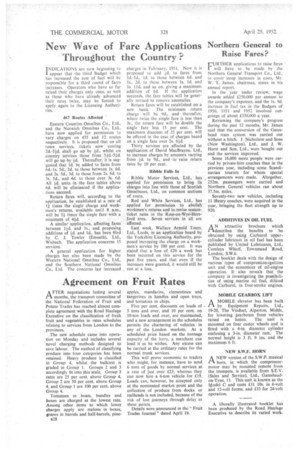Agreement on Fruit Rates
Page 66

If you've noticed an error in this article please click here to report it so we can fix it.
AFTER negotiations lasting several months, the transport committee of the National Federation of Fruit and Potato Trades has reached almost complete agreement with the Road Haulage Executive on the classification of freSh fruit and vegetables in rates schedules relating to services from London to the provinces.
The new schedule came into operation on Monday and includes several novel charging methods designed to save labour. The method of classifying produce into four categories has been retained. Heavy produce is classified in Group 4, whilst the bulkiest is graded in Group 1. Groups 2 and 3 accordingly fit into this scale. Group 3 rates are 25 per cent. above Group 4, Group 2 are 50 per cent. above Group 4, and Group I are 100 per cent above Group 4.
Tomatoes in boats, bundles and boxes are charged at the lowest rate. Among other items to which lower charges apply are melons in boxes, grapes in barrels and half-barrels, pine a28 apples, mandarins, clementines and tangerines in handles and open trays, and tomatoes in chips.
Five per cent, discounts on loads of
5 tons and over, and 10 per cent. on 10-ton loads and over, are maintained, and a new arrangement in the schedules permits the chartering a vehicles in any of the London markets. At a scheduled price based on the tonnage capacity of the lorry, a merchant can load it as he wishes. Any excess can be carried at the ordinary rates for the normal trunk services.
This will prove economic to traders who might, for instance, have to send 6 tons of goods by normal services .at a rate of just over £23, whereas they can now hire a 6-ton vehicle for £19. Loads can, however, be accepted only at the nominated market point and the collection of produce from docks or railheads is not included, because of the risk of lost journeys through delay at these points.
Details were announced in the "Fruit Trades Journal" dated April 19.




























































































































































































































